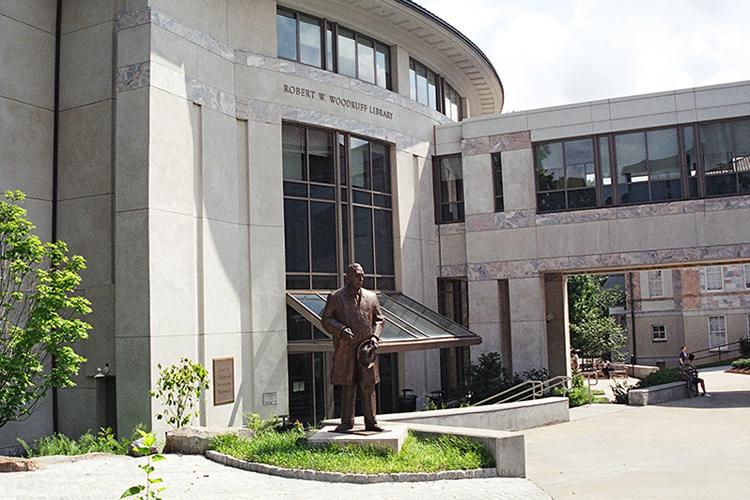Booked and Busy: Get to Know Your Librarian

With many students writing midterm papers or looking ahead to finals, the Robert W. Woodruff Library remains a vital resource that has not only adapted to the current pandemic but is actively expanding its offerings. For example, subject librarians are available to help students and faculty find resources pertaining to specific subject areas. Librarian Tarina Rosen’s expertise covers three areas: Linguistics, Russian and Eastern European Studies, and Jewish Studies. Rosen holds an MS in Library and Information Sciences as well as an MA in Russian Literature. She not only works with Acquisitions to purchase books in the above areas, but she manages book-buying plans for Russian-language books (from Russia) and Hebrew-language books (from Israel).
Tools curated by subject librarians like Rosen include research guides. “Those are helpful because we have so many resources and they put all the major ones for a subject in one place,” Rosen says. Their range is vast—Jewish studies research guides, for example, cover time periods and topics such as Biblical archaeology, the Holocaust, and modern Israel. Additionally, professors can request a specific course guide to be created just for their students. Many undergraduates are also unaware of interlibrary loans, a process through which the library can borrow resources from other institutions at the request of students and faculty.
With the vast amounts of unverified and even false information plaguing the internet today, conducting your online research through Woodruff Library’s website is the safest route. Rosen says, “I know many students want to go to Google and that can be helpful, but you must to be really careful to evaluate what you find there, whereas anything you find in our databases is definitely fine to use in a paper. It has been vetted that it’s academic level and is OK to use.”
With access to the library limited, the staff has also changed their processes to include safety measures like requiring appointments to enter and restricting access to the stacks. Both students and faculty can request books online and pick them up directly outside the library via newly-installed package lockers. Additionally, if you want to consult with a subject librarian, the formerly in-person appointments are now conducted via phone, Zoom, or email. Rosen prefers email.
Unsurprisingly, the change in course delivery has resulted in a large increase in the number of digital materials being added to the library’s collections, mainly e-books and streaming video. “One of the most difficult aspects is that people in the humanities tend to use older materials as well as new ones, so I get many requests for older books and films as e-books and streaming video. Some of them we can supply, but some are just not available,” Rosen says, noting that many foreign and older films have not been digitized. Acquiring digital materials is further complicated by the fact that they require licensing.
“There’s a lot of teamwork that goes on behind the scenes in the library,” Rosen says, and she is grateful to have her fellow subject librarians and the Head of Collections to help her navigate e-books and the Film Studies Librarian to help with the complexities of acquiring streaming video.
Rosen’s final piece of advice to students is simple: if you feel stuck in your research or simply don’t know where to start, just use the “Ask a Librarian” tool, which can be accessed right from the front page of Woodruff Library’s website.